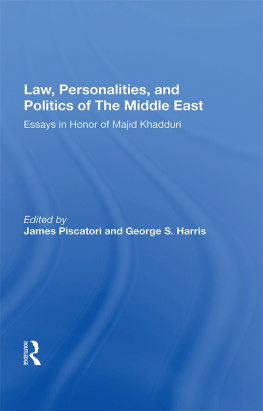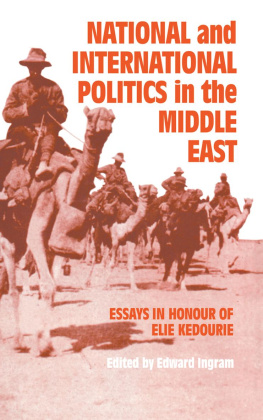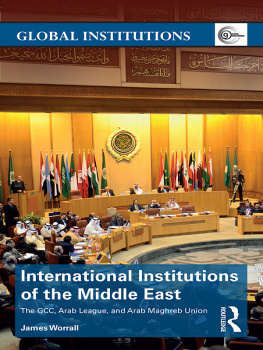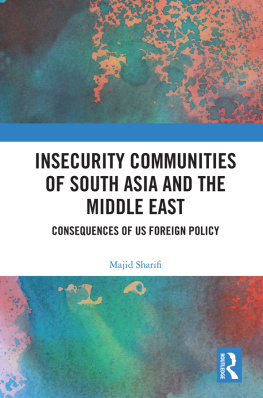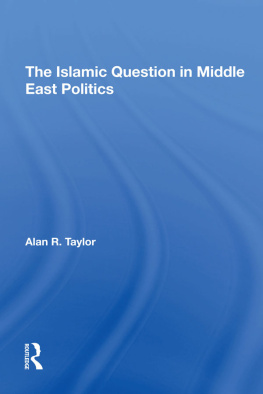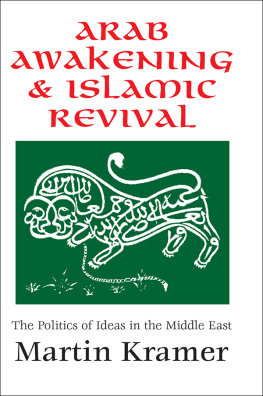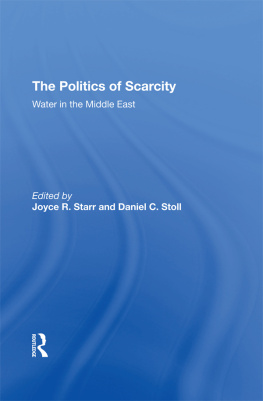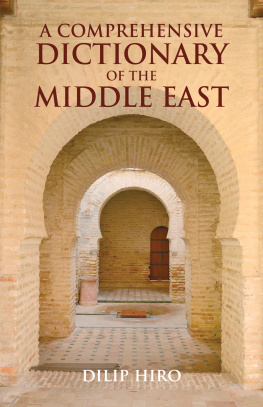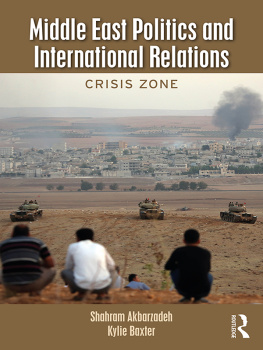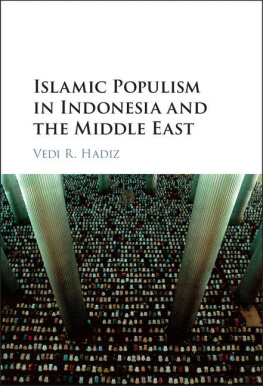Designed by Maria fosephy Schoolman
First published 1987 by Westview Press
Published 2018 by Routledge
52 Vanderbilt Avenue, New York, NY 10017
2 Park Square, Milton Park, Abingdon, Oxon OX14 4RN
Routledge is an imprint of the Taylor & Francis Group, an informa business
Copyright 1987 by The Middle East Institute, Washington, D.C.
All rights reserved. No part of this book may be reprinted or reproduced or utilised in any form or by any electronic, mechanical, or other means, now known or hereafter invented, including photocopying and recording, or in any information storage or retrieval system, without permission in writing from the publishers.
Notice:
Product or corporate names may be trademarks or registered trademarks, and are used only for identification and explanation without intent to infringe.
Library of Congress Catalog Card Number: 87-61445
ISBN 0-916808-32-7
ISBN 13: 978-0-367-02261-7 (hbk)
This book is a tribute to Majid Khadduri, written by his friends and former students. It is testimony to the intellectual inspiration which he has been to two generations of students and scholars in Washington and elsewhere, and is divided into sections corresponding to the three principal fields of his own work:
- (1) Islamic and international law;
- (2) ideas and personalities in the Arab world;
- (3) politics and diplomacy in the Middle East.
Islamic and International Law
Judge Gamal M. Badrs Islamic Law and the Challenge of Modern Times is a commentary on the need for Islamic law to adapt to current conditions. He emphasizes the need for ijtihad or independent judgment and questions the relevance of qiyas or analogy as a means today of evolution of legal doctrine. This recalls Professor Khadduris demonstration that jurists in the early Abbasid period questioned the equity of qiyas and that al-Shafii, while limiting ijtihad to qiyas only, attempted to restrict its usage to details and to prescribe rules for its employment.
Badr also endorses maslaha or the public interest when it is consistent with general directives of the sharia, in the process criticizing the Hanbali Najm al-Din al-Tawfi as advocating too loose an interpretation of maslaha. He specifically cites Khadduris discussion of al-Tawfi, and although he takes a somewhat critical view of this jurist, he follows Khadduris general approval of maslaha as positive in character, intended to promote general welfare and reduce social vices ( The Islamic Conception of Justice, p. 182). Although there are important differences in their arguments, Badr and Khadduri also share a relatively liberal view of riba, interest in economic dealings, and both register their specific approval of the Egyptian Civil Code, which was written by Abd al-Razzaq al-Sanhuri, whom Professor Khadduri knew and greatly admired.
Henry Cattan writes on the Legal Status of Jerusalem. Like Khadduri, he relates international law to situations of conflict. While never a dominant theme in Khadduris work, the Arab-Israeli dispute appears throughout a book he edited, Major Middle Eastern Problems in International Law, and in Political Trends in the Arab World.
James Piscatoris article on Saudi Arabia, Culture Change, and the International Legal Order is an extension of Khadduris work on classical international law. It argues, first, that there is a mixture of traditional and modern political and legal perspectives in Saudi Arabia, just as Khadduri, in Political Trends in the Arab World, argues of the contemporary Middle East in general; and, second, that this mixture affects the elites attitudes toward international law. The basic conclusionthat Saudi Arabia is willingly part of the international legal systemis consistent with Khadduris conclusion that Muslim states are reconciled to the norms of modern international law.
Ideas and Personalities in the Arab World
Ambassador Hermann Eilts, with his customary attention to detail, presents what we believe will be the definitive account of Ameen Rihanis attempt to mediate the conflict between Abd al-Aziz Ibn Saud and Sharif Husayn in the Hijaz in the period 19191925. This complements and fills in the story of Saudi Arabia that Khadduri tells in his portraits of King Faysal and Kings Khalid and Fahd. Eilts shows Rihani to be pre-eminently dedicated to Arab nationalism, naturally a subject of some fascination for Khadduri.
John Peterson writes on Arab Nationalism and the Idealist Politician: The Career of Sulayman al-Baruni, an early Libyan nationalist and political thinker. In calling al-Baruni an idealist and an intellectual politician, Peterson follows the categorization used by Khadduri in Arab Contemporaries: The Role of Personalities in Politics. Peterson helps to shed light on al-Baruni by comparing him to a figure of interest to Khadduri as well, Aziz Ali al-Misri.
Mudhafar Amin and Edmund Ghareeb explain the origins and political philosophy of the Ahali group, Iraqi social reformers and political activists who first made their mark in the 1930s. It is a topic to which Khadduri devoted considerable attention in Independent Iraq. In addition to this, Amin and Ghareeb rely on Khadduris treatment of Kamil al-Chadirchi, who, while not a founder, quickly became one of the intellectual guides of the group. Khadduris scholarly interest is not surprising: Ahali members were of his generation. He was in secondary school when anti-British nationalist sentiments seized many of his contemporaries, and, like some of them, he went on to the ideologically tolerant campus of the American University of Beirut where, however, their paths were to diverge.
Politics and Diplomacy in the Middle East
Tareq Ismael writes on The Communist Movements in the Arab World. It is a subject to which Professor Khadduri has turned time and again, particularly in his studies of Iraq. Ismael refers several times in the course of his exposition to Khalid Bakdash, head of the Syrian Communist Party, on whom Khadduri has offered a full assessment.
George Harris presents a case study of a little understood episode in Iranian history in which a communist movement briefly held power in the province of Gilan. This study, in a specific way, develops themes on the interplay of ideology and power, communism and nationalism, that are discussed by both Khadduri and Ismael.
Stephen Grummon writes on The 1820 Expedition to the Gulf and the Decline of British Commercial Shipping, challenging the conventional view of motives and results of British policies in the Gulf. This covers an earlier period than is usually associated with Khadduri, but his interest in the British role in the region is seen, of course, throughout Independent Iraq.
It is only fitting that the contributors to this volume have ties of intellectual and personal friendship to Professor Khadduri. Gamal Badr and Khadduri have read and admired each others work on Islamic law for years, and there has been a long association between Khadduri and Henry Cattan. Cattan contributed a chapter to Khaddurs joint enterprise with Herbert Lie-besny, Law in the Middle East, still a standard on the subject. James Piscatori benefited from Professor Khaddurs advice on his doctoral research and now teaches the courses formerly taught by him at the Johns Hopkins School of Advanced International Studies (SAIS).
Hermann Eilts is a graduate of SAIS although just prior to Khaddurs time. Later, however, he arranged to study Islamic law under Khadduri. The two have maintained regular professional and personal contact for many years, not least through the Shaybani Society of International Law, of which Professor Khadduri has been President since 1969. John Petersons graduate work was supervised by Khadduri, and although Mudhafar Amin was never formally Khaddurs student, his work on the Ahali group puts him in Khaddurs tradition as well. Edmund Ghareeb, happily, is linked to Khadduri both by the scholarly ties of research on Iraq and by family ties.

